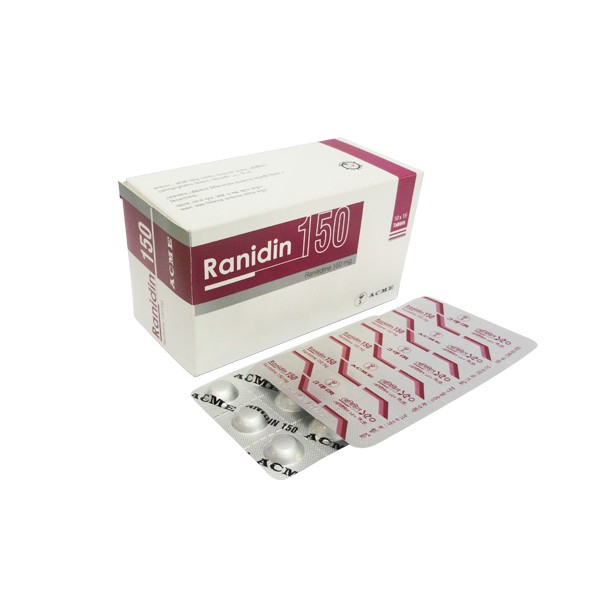
- Stock: In Stock
- Brand: Acme Laboratories Limited
- Product ID: Ranitidine
100% Secure Payment

Ranidin 150 mg Tab
DESCRIPTION
RANIDIN (Ranitidine) is a potent histamine (H2) receptor antagonist. RANIDIN (Ranitidine) lowers the excess gastric acid secretion by blocking the histamine (H2) receptor and thus accelerates ulcer healing process. RANIDIN (Ranitidine) antagonizes the H2 receptor and inhibits the action of histamine on acid secretion.
COMPOSITION
RANIDIN 150 Tablet : Each film-coated tablet contains Ranitidine (as hydrochloride) USP 150 mg.
RANIDIN 300 Tablet : Each film-coated tablet contains Ranitidine (as hydrochloride) USP 300 mg.
RANIDIN Syrup : Each 5 ml syrup contains Ranitidine (as hydrochloride) USP 75 mg.
RANIDIN Injection : Each 2ml ampoule contains Ranitidine HCI USP 55.8 mg equivalent to 50 mg Ranitidine.
INDICATIONS
Benign gastric and duodenal ulcer, Reflux esophagitis, NSAID-associated ulceration, Chronic episodic dyspepsia, Zollinger-Ellison syndrome, Gastric acid reduction (prophylaxis of acid aspiration) in obstetrics and in surgical procedures.
DOSAGE AND ADMINISTRATION
Tablet & Syrup : Benign gastric and duodenal ulcer : 150 mg (2 teaspoonful) twice daily or 300 mg (4 teaspoonful) at night for 4-8 weeks.
Maintenance dose : 150 mg (2 teaspoonful) at night. Reflux esophagitis : 150 mg (2 teaspoonful) twice daily or 300 mg (4 teaspoonful) at night for up to 8 weeks, or if necessary 12 weeks [moderate to severe, 150 mg (2 teaspoonful) 4 times daily for up to 12 weeks].
Long-term treatment of healed esophagitis : 150 mg (2 teaspoonful) twice daily. Zollinger-Ellison syndrome : 150 mg (2 teaspoonful) 3 times daily; doses up to 6 g daily in divided doses have been used. NSAIDassociated ulceration : 150 mg (2 teaspoonful) twice daily or 300 mg (4 teaspoonful) at night for up to 8 weeks. Prophylaxis of NSAID-induced duodenal ulcer : 150 mg (2 teaspoonful) twice daily. Chronic episodic dyspepsia : 150 mg (2 teaspoonful) twice daily or 300 mg (4 teaspoonful) at night for up to 6 weeks. Gastric acid reduction (prophylaxis of acid aspiration) in obstetrics : 150 mg (2 teaspoonful) at onset of labour, then every 6 hours; Surgical procedures : 150 mg (2 teaspoonful) two hours before induction of anaesthesia, and also, when possible on the preceding evening.
Children (Peptic ulcer) : 2-4 mg/kg twice daily to a maximum of 300 mg (4 teaspoonful) daily.
Injection : RANIDIN injection is administered intramuscularly or intravenously. By intramuscular injection, 50 mg every 6-8 hours. By slow intravenous injection, 50 mg diluted to 20 ml and given over at least 2 minutes; may be repeated every 6-8 hours. By intravenous infusion, 25 mg/hour for 2 hours; may be repeated every 6-8 hours. Prophylaxis of stress ulceration, initial slow intravenous injection of 50 mg then continuous infusion, 0.125-0.250 mg/kg/hour. Surgical procedures, by intramuscular or intravenous injection, 50 mg 45-60 minutes before induction of anaesthesia (intravenous injection diluted to 20 ml and given over at least 2 minutes).
OR AS DIRECTED BY THE PHYSICIAN
SIDE EFFECTS
Ranitidine is usually well tolerated. Headache, dizziness, rash, tiredness and gastrointestinal disturbances may occur.
CONTRAINDICATIONS
Ranitidine is contraindicated in patients with known hypersensitivity to the drug.
PRECAUTIONS
Ranitidine should be used with caution in hepatic impairment, renal impairment, pregnancy (Pregnancy category B) and breast-feeding.
SUPPLY
RANIDIN 150 Tablet : Box containing 10 x 15 tablets in Alu-Alu blister strips.
RANIDIN 300 Tablet : Box containing 10 x 10 tablets in aluminium strips.
RANIDIN Syrup : Bottle containing 100 ml syrup with a measuring cup.
RANIDIN Injection : Box containing 2 x 5 ampoules in blister strips.






























